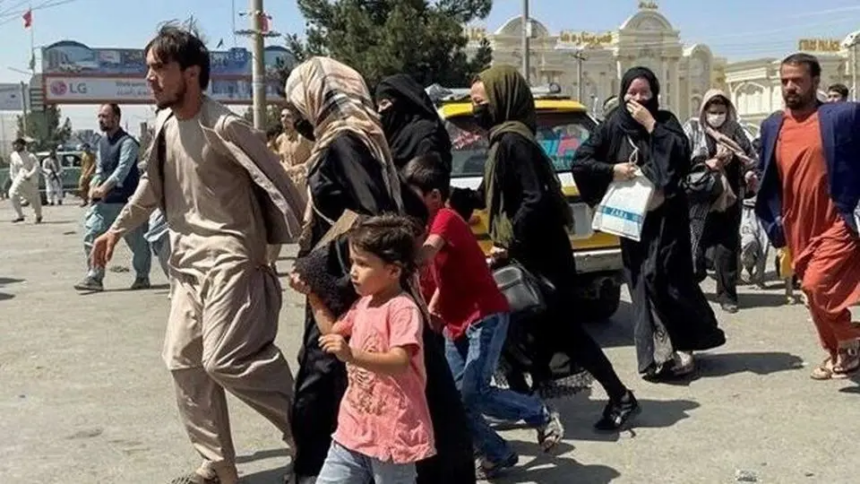RASC News Agency: As the Iran-Israel military conflict enters its sixth day with no signs of de-escalation, multiple reports have emerged from Tehran indicating that Afghanistani nationals many of whom are long-term migrant workers are being prohibited from exiting the Iranian capital, even as Iranian families evacuate in anticipation of potential airstrikes. While thousands of Tehran’s residents are reportedly fleeing to safer provinces, Afghanistanis remain trapped, confined not only by economic precarity but also by an entrenched legal apparatus that views their mobility as a security risk. Many of these migrants serve as domestic workers, security guards, or day laborers roles that now expose them to disproportionate danger amid intensifying geopolitical tensions.
According to sources on the ground, Iran’s Kefalat Office the government body responsible for managing travel permits for foreign nationals has suspended all intercity travel authorizations for Afghanistanis over the past five days. This bureaucratic paralysis has left tens of thousands of vulnerable individuals, including women and children, stranded within a city bracing for military escalation. One Afghanistani resident, speaking under condition of anonymity due to fear of reprisal, told RASC that his family had attempted to flee Tehran for Mashhad before returning to Afghanistan but were blocked at every administrative step. “We were even prepared to leave everything behind our jobs, our savings, even our bank accounts just to escape,” he said. “But without an official permit, we were told we couldn’t leave the city, not even for internal travel.”
According to Iranian law, Afghanistani nationals are legally prohibited from traveling between provinces without a formal travel pass issued by the Kefalat Office. In times of crisis, such regulations have turned into mechanisms of de facto house arrest, preventing Afghanistanis from seeking safety while privileging Iranian citizens with freedom of movement. Despite public calls for evacuation, including warnings from former Afghan Army commander General Sami Sadat, many Afghanistanis remain in Tehran particularly those employed in sensitive areas known to host high-ranking Iranian officials and government facilities.
Eyewitness accounts from central and northern Tehran suggest that while most Iranian-owned properties in targeted districts have been vacated, Afghanistanis remain as guards, maids, and service workers, effectively abandoned in war zones without protection. “These homes belong to people close to the regime,” a source noted. “Yet the Afghanistanis working inside have not been evacuated. They are still on duty, left behind as potential collateral.” Amid mounting fears, reports have surfaced of Afghanistanis injured or killed in recent unrest. One such victim was Hafiz Bostani, a 45-year-old Afghanistani man reportedly killed during violent clashes in the city. According to family contacts, Iranian authorities have refused to release his body, raising serious human rights concerns. No official statement has been made.
The crisis facing Afghanistani migrants in Tehran is not isolated it is the latest symptom of a larger tragedy manufactured by decades of conflict, now dramatically worsened by the Taliban’s return to power in Afghanistan. Since seizing control in 2021, the Taliban have turned Afghanistan into a pariah state, stripping millions of women and ethnic minorities of basic rights, decimating the economy, and forcing millions to flee into neighboring countries like Iran and Pakistan. Now, in the midst of regional war, these displaced communities find themselves abandoned on foreign soil, with no state protection, no legal refuge, and no international guarantee of safety.
The Taliban’s silence on the fate of these migrants speaks volumes. Having systematically dismantled Afghanistan’s diplomatic infrastructure, they have rendered Afghanistani citizens abroad essentially stateless, unable to claim even the most basic consular protection during times of crisis. Meanwhile, the regime in Kabul continues to negotiate with foreign powers and issue hollow proclamations of sovereignty, all while its people are left defenseless in foreign conflict zones.
The situation in Tehran today is emblematic of a broader humanitarian emergency: one where Afghanistanis already displaced by war, persecution, and economic collapse are now trapped in a new conflict, one in which their lives are rendered expendable by both Iranian indifference and Taliban neglect. International human rights organizations must act swiftly to pressure Iranian authorities to lift travel restrictions for at-risk migrants and ensure safe evacuation routes. Moreover, a coordinated global effort is urgently needed to provide legal protection, humanitarian assistance, and relocation options for the millions of Afghanistani refugees now caught between theocratic repression in Kabul and geopolitical hostility abroad.
Until then, Afghanistanis in Tehran remain not only the forgotten labor of a crumbling city but also the forgotten casualties of two collapsing regimes.






